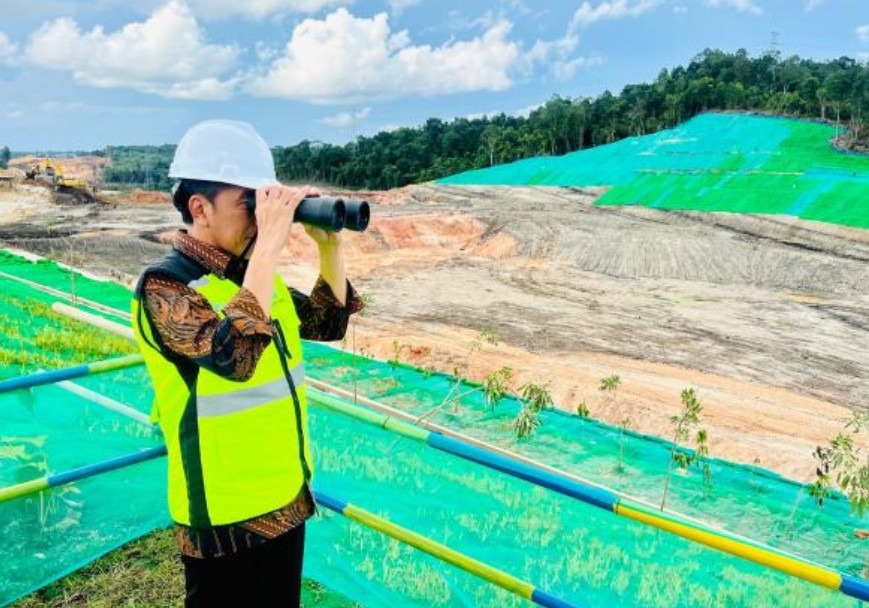Popular Reads
Top Results
Can't find what you're looking for?
View all search resultsPopular Reads
Top Results
Can't find what you're looking for?
View all search resultsNationalism not economics behind Jokowi rhetoric: Analysts
President Joko “Jokowi” Widodo has deployed nationalist rhetoric on a number of different issues in recent weeks, sparking a debate over the motivations for the tone shift.
Change text size
Gift Premium Articles
to Anyone
P
resident Joko “Jokowi” Widodo has deployed nationalist rhetoric on a variety of issues in recent weeks, and while many of his arguments are couched in the language of economics, observers say the motivations behind the shift in tone may be more complex than financial prudence alone.
Having governed the nation for more than eight years, Jokowi has established a distinct brand of developmental economics rooted in a drive for international competitiveness and added-value industries.
The government has focused on equitable development, poverty eradication and infrastructure projects as the three pillars of “Jokowinomics”.
But the businessman-turned-politician has recently been supplementing this long-held policy with more than a dash of “Indonesia first” rhetoric, with healthcare, banking, transportation and the garment industry all in his crosshairs.
On March 6, he lamented that nearly 2 million Indonesians sought medical treatment abroad annually, which he claimed cost the state some Rp 165 trillion (US$10.7 million) per year. The spotlight comes as his administration seeks public support for a legislative overhaul of the health sector, which faces resistance from medical professionals.
Last week, at an event to promote the use of domestic products and services, the President called on regional governments nationwide to wean themselves off global, United States-centered payment networks like Mastercard and Visa in favor of credit cards issued by domestic banks.
Jokowi cited the sanctions imposed on Russia by the US as the reason Indonesia needed to develop greater independence in processing financial transactions.
Later at the same event, the President ordered authorities to stop importing used garments, claiming that it “heavily disrupts the local textile industry”. The garment industry has seen a significant drop in revenue over the past year and a half, accompanied by layoffs.
The President’s rhetoric, while it deploys the language of economics, has baffled a number of observers, including Centre for Strategic and International Studies (CSIS) political researcher Arya Fernandes.
“The government’s public approval rating is above 65 percent and the national economy has improved [since the pandemic], so I’m not sure what the reasoning behind this is,” Arya told The Jakarta Post over the weekend.
Despite doubts about the feasibility of, and the motivations behind, what the public is calling a crackdown on thrifting, the police and excise authorities have acted swiftly to carry out the President’s directive. A police task force in Riau recently burned Rp 10 billion (US$650,000) worth of used clothing, with more destruction in the pipeline.
Cultural anxieties
For some analysts, the nationalist rhetoric is, in part, a matter of personal conviction.
“I see this as some sort of a cultural anxiety from the President, as we’ve been relying too much on imported goods on everything, including important commodities,” Indonesia Political Review executive director Ujang Komarudin told the Post on Monday.
However, Ujang also touched on a frequent criticism of Jokowinomics – that the President’s proposals were not sufficiently backed up by the work of his Cabinet.
“He’s using [the rhetoric] to drive momentum and raise awareness about domestic products, but it is useless if all this campaigning is not followed up on,” the analyst said.
Despite a government goal of ensuring certain staple foods are supplied entirely by domestic producers, for instance, the nation been importing rice since December 2022 and has plans to bring in an additional 500,000 tonnes if necessary. In preparation for Ramadan, the Trade Ministry approved the import of sugar, soybeans and beef in February as well, state news agency Antara reported.
Meanwhile, Wasisto Raharjo of the National Research and Innovation Agency (BRIN), said Jokowi’s change in tone was to score points with a public wary of foreign influence.
“I see this as an attempt to build a patriotic narrative, which is pretty common among leaders of a developing democracy to court public sympathy,” Wasisto said over the weekend.
But not everyone is happy with the comments the President has been making.
The crackdown on thrifting, for example, was not warmly received, with small thrift shop owners complaining that their businesses would have to shutter and trade associations insisting that simply banning the sale of secondhand goods would be ineffective.
Meanwhile, the House of Representatives has bought into the domestic industry-first narrative, criticizing plans for commuter line operator PT Kereta Commuter Indonesia (KCI) to import used Japanese trains to replace its aging fleet when trains can be manufactured locally.
“This contradicts President Jokowi’s instruction to prioritize domestic businesses. We already have [PT Industri Kereta Api], which is capable of producing trains, including the ones used for the Greater Jakarta LRT. So why do we insist on importing junk from Japan?” said Gerindra Party politician Bambang Haryadi recently.










